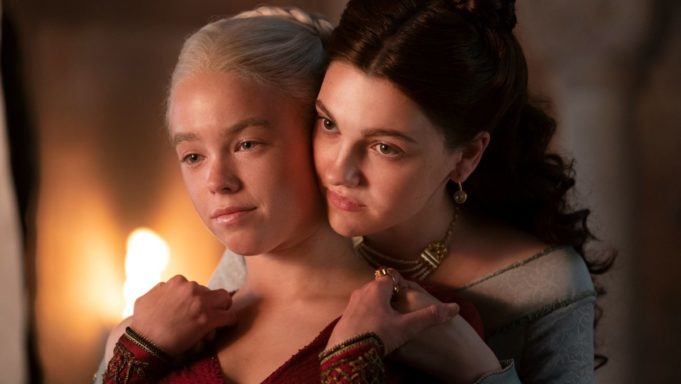“Uneasy lies the head that wears the crown,” said Henry IV in Part 2 of the Shakespeare play that bears his name, and while King Viserys rarely bothers donning the literal circlet of his office, the job has indeed made him uneasy. In “Second of His Name,” the third episode of House of the Dragon, the king can’t even enjoy the nameday buffet for his 2-year-old son Aegon without an advisor hassling him about something, never mind that he is now two fewer fingers on his left hand, a physical consequence of sitting on the Iron Throne. The latest splinter under Viserys’ proverbial thumbnail is his new Master of Ships, Tyland Lannister, bothering him about Lord Corlys and Prince Daemon’s flagging campaign in the Stepstones, for what seems like the umpteenth time. Dude can’t even enjoy a plate of roasted pears without some nervous nerd taking up his time.
If you’ve seen that Simpsons episode that opens with a clip from the fictitious movie Star Trek XII: So Very Tired, Viserys’ response to the Stepstones news is basically, “Ugh. Again with the Klingons.” He tells Tyland that a discussion of a conflict that has already dragged on for three years can wait a few more days, but Tyland bends his ear anyway, beseeching the king to send reinforcements, as the Crabfeeder’s forces hide in caves whenever Daemon brings his dragon to bear. We see the limitations of Caraxes’ fiery breath in the episode’s opening, and if viewers can’t comprehend the gravity of a dragon being unable to roast its enemies, Daemon takes an arrow to the shoulder, just to drive home how badly this fight is going. Caraxes is forced to flee, flapping into the sky, his serpentine form looking like the visual incarnation of a defeated hiss. Viserys and the rest of his council are mostly unaware of just how badly that conflict is going, but it seems they would be unmoved regardless: Corlys and Daemon started the war on their own. Ergo, they should finish it themselves. About his brother, Viserys could hardly care less at the moment. About his daughter, however, he seems positively obsessed, for she is not at her sibling’s party, and, for that, Viserys is pissed.
Rhaenyra, still mad at her dad for marrying her erstwhile bestie Alicent, is beneath the bows of a weirwood tree, reading a huge book and making a bard play the same song over and over, refusing to participate in the festivities until Alicent, heavily pregnant with Viserys’ second child, shows up and asks her to join them in the hunt in honor of Aegon’s second nameday. Rhaenyra declines her queen’s entreaties until she forces Alicent to admit that it’s an order from the king. And in the carriage ride to the King’s Wood, Rhaenyra turns this obstinance into full-on teenager-in-war-with-a-parent, diffident and defiant, refusing to participate in any activity, smugly noting that all the VIPs awaiting their arrival at the hunting camp are “not there for me.”
She’s half-right. The nobles are indeed there in support of toddler Aegon, but an assemblage of ladies from the houses Lannister and Redwyne do find Rhaenyra useful as a target for their passive aggressiveness, transferring the blame for her uncle Daemon’s war — and the increased likelihood of the realm’s engagement in it — to her and her father. She deftly parries their aspersions, then takes her leave when the tenor of the conversation sharpens.
I love the scenes between Viserys and Rhaenyra. Paddy Considine and Milly Alcock play these roles as if they were actual father and daughter arguing about her having to go to a Chuck E. Cheese because he just had to get remarried and have another kid. But in this scene with the catty noblewomen, Alcock is satisfyingly competent. Rhaenyra pivots from dutiful diplomacy to verbal assassin. “And how have you served the realm of late, Lady Redwyne?” the princess says. “By eating cake?”
Lady Redwyne, named Olenna and the ancestor and namesake of Game of Thrones’ thorny Olenna Tyrell, has little to do but shut the fuck up.
Is Rhaenyra a privileged royal flexing on her political inferiors? Yes. She is a princess, after all. Is she spoiled? What princess isn’t? Entitled? Why wouldn’t she be? But while Olenna Redwyne presumably sat around clutching a pug and snacking, Rhaenyra was the one who got on a dragon and stopped Daemon’s play at rebellion in its tracks. And with regard to the shaky ground of her royal status, her 17-year-old angst is well-founded: Viserys might disagree with her assessment, but she knows that for all practical purposes, she is important to her father — and the realm — only as long as she remains his heir, and with her toddler half-brother in the corner of the carriage, gabbling in the lap of his nursemaid, her status as the future Queen of the Seven Kingdoms is on borrowed time. Indeed, when she takes her leave of the noblewomen, the reality of her impending, diminished role is made plain when she is forced to suffer an arrogant, presumptuous suggestion of marriage from Tyland’s twin brother Jason.
She wastes no time in finding her father and throwing Jason’s proposal in his face like a cup of unimpressive Casterly Rock red. Viserys gets Dad Mad, airing his frustration at her refusal to follow the rules of her station, telling her he has been “drowning in a lake of parchment” from all over Westeros asking for her hand. Her place in line weighs heavily on Viserys, who is under pressure from Otto Hightower, Queen Alicent’s father, to name Aegon the toddler the rightful heir ahead of Rhaenyra. Otto, whose own schemes are dependent on the children Viserys sires upon Alicent, needs Rhaenyra to be married off even more than Viserys does. Weary of the politicking, the king gets shitfaced, and Otto cools his jets.
As the Hand of the King, Otto Hightower wields heavy influence, but he is not Viserys’ only advisor. Lyonel Strong, Master of Laws, comes to the king with a better, more agreeable marriage proposal for Rhaenyra: Lord Corlys’ son Laenor. Not only would such a marriage mend the rift between Viserys and House Velaryon, but Laenor is also of pure Valyrian stock, and in line with the Targaryen traditions of incestuous matrimony, he is Rhaenyra’s cousin.
Laenor is also a dragon rider, as we learn in the episode’s final scene, but before that reveal, we have to sit through scenes of Rhaenyra’s edgy flight from the camp, pursued by her handpicked Kingsguard knight Ser Criston Cole and Viserys’ disinterested, wine-addled effort in his son’s nameday hunt. Criston catches up to her at a pond, and they spend the rest of the day hanging out in the woods, where she gripes about her situation and how she is largely barred from making her own decisions. Then they get attacked by a boar. The boar is scary. It knocks Criston ass-over-teakettle, then charges at the princess, pinning her. She nearly succumbs to its tusks before Criston saves her life with a thrust of his sword through its neck, but in its death throes, it lunges at Rhaenyra. The princess reacts in absolute fury, stabbing it with a dagger until she’s covered in gore.
As for her father, Viserys, standing in front of a bonfire that seems like an ominous portent of his kingdom’s own future, tells Alicent that he never imagined remarrying or siring a son after he had already named Rhaenyra his heir. When he thought he did the right thing, life found a way to erase his certitude.
Viserys is as bent out of shape about his son’s potential to usurp his daughter’s claim as Rhaenyra is. Added to this trouble: The hunt itself has become tedious. Though his Hand intimated that an elusive white hart had been sighted — a good omen for his son’s nameday — the stag brought to Viserys the next morning for his killing blow is just a regular old deer and Viserys is too hungover to do the job with one strike. It’s sad and embarrassing. The white hart’s absence just adds to his anxieties. Yet while it did not show up to bring good tidings for toddler Aegon, it does make an appearance for the child’s older sister. Viserys’ lackluster performance is followed by a scene with Rhaenyra and Criston, saddled up and ready to return, who are given pause when the white hart shows up for them. Criston begins to draw his sword, but Rhaenyra stays his hand.
I think this is interesting because had the king’s men captured the legendary creature, Viserys, out of expectation, would have slain it. Rhaenyra, however, makes a decision that is all her own, and like the portentous bonfire lighting Viserys’ dark night of the soul, letting the white hart live foreshadows the princess’ future plans to take control of her own destiny in defiance of her father and the realm’s traditions. And when Rhaenyra and Ser Criston walk into camp, covered in blood and dragging the dead boar on a litter, the nobles cannot help but be confronted with the fact that Rhaenyra is not to be fucked with.
The queen, for her part, is well aware of the power Rhaenyra wields, but she also knows that it is the king’s power that has the greatest impact and convinces him to aid his brother in the Stepstones. “Is it better for the realm if the Crabfeeder thrives or is vanquished?” she posits.
Viserys heeds her advice. The next day, he dispatches a letter for hand-delivery to Daemon, informing his brother that 10 ships and 2,000 soldiers are on their way. And then the king and Rhaenyra have another dad-and-daughter fight, and it’s sad.
“You have no further use for me,” she says. “You might as well peddle me for what you can — a mountain stronghold or a fleet of ships.”
Viserys is visibly hurt, but Rhaenyra does not relent, dismissing the oft-told tale of his dutiful marriage, asserting that if his marriage was for advantage, he would have married 12-year-old Laena Velaryon. Viserys’ compromise: The princess must marry, but she can find a husband she likes on her own.
Speaking of the Velaryons, Lord Corlys lays out the state of affairs to his lieutenants, which include his brother Vaemond and the aforementioned Laenor: Their dwindling supplies and ever-shrinking fleet give them about two weeks to wrap up their fight in the Stepstones, currently floundering on Bloodstone Island thanks to the caves and archer-covered bluffs that give the Crabfeeder the tactical advantage. Laenor proposes a feint in the form of “an offering of flesh to bait the Crab,” a suicide mission that no one has the guts to take on.
No one except Daemon, that is. Though his uncle Vaemond believes the prince is the reason they are losing, Laenor believes in the prince’s prowess. Daemon joins them. Vaemond, low-key fomenter of mutiny, reiterates that the tide must turn or else. Daemon stands there without response, until the messenger Viserys sent appears. Daemon’s reply, after reading the letter, is to bash the poor guy in the face repeatedly with his helm.
Daemon’s story thus far has been about impotence — from his status as a second son to his own floppy rod and his stillborn declaration of independence and now to his inability to burn a bunch of pirates off a worthless islet. To accept the Crown’s aid is to pile on more humiliation, so he takes matters into his own hands. Like his niece’s choice to spare the white hart, Daemon takes charge of his own destiny, marching onto the battlefield and waving the white flag. The ruse works. Daemon lures his foes from their hiding places, then charges them and cuts them to pieces with Dark Sister, his famed Valyrian longsword. Laenor, riding his own dragon (named Seasmoke, per the subtitles), makes easy work of the archers and the forces surrounding his prince, while Corlys, Vaemond, and their foot soldiers mop up the rest. Despite taking an arrow to the knee, Daemon finds the Crabfeeder and serves him a hefty helping of Valyrian steel, emerging from the villain’s hidey hole dragging his innards-spilling torso by the arm. After three years of flaccid attempts to take the island, Daemon has finally risen to the occasion, and presumably, the Stepstones will trouble King Viserys no more. Until next Sunday, anyway.












